Globalization of Soccer Kicks Local Fans
Globalization of Soccer Kicks Local Fans
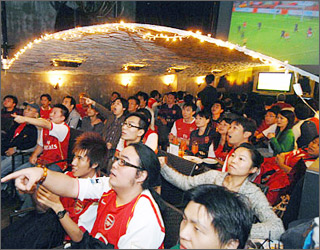
afar
LONDON: Soccer is quite aptly called the "world's game." The sport's superstars are household names around the globe. Its landmark competition – the World Cup – is watched by hundreds of millions. Even gun-toting insurgents in Iraq can be spotted wearing replica shirts of Europe's most fashionable clubs.
Not everyone in Britain, however, revels in the game’s global appeal. As domestic leagues look increasingly to foreign markets, local supporters see their teams drifting from their moorings. Such fear was evident after Richard Scudamore, chief executive of the English Premier League (EPL), proposed that a "39th game" be added to the league's traditional 38-game calendar and, more controversially, that the game be held abroad.
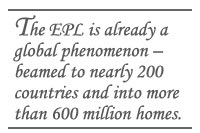
“Is it April Fool's?” asked one irate football manager. Critics labeled the plan “comical.” Fans across the country wrote into tabloids and called talk radio shows, bemoaning the voracious greed of Scudamore and his vision of a regular "international round" of matches. Some imagined a doomsday scenario of English clubs based permanently abroad, an era of Manchester United of Dubai and Liverpool of Shanghai. Opposition was unanimous; the English game must be protected.
For now, the Premier League looks likely to remain on English soil after threats from football's world governing body scuppered Scudamore's plans. The EPL chief is reconsidering his proposal: "We want to address globalisation and embrace this opportunity, whether in this form or not we can't be definitive." Victory! the fans crowed.
In truth, this is not some resounding victory for the plucky forces of the home-grown against the powers of globalization. Even if no EPL fixtures are played in Macau any time soon, the league is still lifting off from its base.
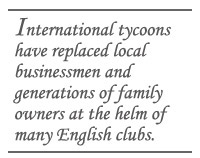
The EPL is already a global phenomenon – beamed to nearly 200 countries and into more than 600 million homes. Even Middlesbrough, a decidedly mediocre team, has organized support groups in Indonesia and Singapore. South African football officials considered shifting kick-off times of their domestic league to avoid coinciding with those of the EPL; many fans in South Africa prefer huddling around TV sets to watch their heroes in England than follow their own club teams. Uganda is notoriously divided between London clubs Chelsea and Arsenal, with the latter’s Kampala supporters making a hit music video celebrating their love for the team. Here and elsewhere, the EPL has left an indelible mark.
At the same time, the EPL increasingly draws serious foreign investment. International tycoons have replaced local businessmen and generations of family owners at the helm of many English clubs. Russian oil magnate Roman Abramovich bought Chelsea in 2003. His astronomical spending (£578 million in less than five years) brought success to the club, but also inflated transfer fees and wage bills around the league and Europe. To remain competitive, a number of top teams required injections of foreign capital. Soon after Abramovich muscled into the EPL, the American billionaire Malcolm Glazer acquired Manchester United for a cool $1.47 billion. He preceded compatriots Tom Hicks and George Gillett, who bought Liverpool, and Randy Lerner, who took over Aston Villa. Even disgraced former Thai Prime Minister Thaksin Shinawatra owns a club, bankrolling the reviving fortunes of Manchester City. The influx of foreign owners left a bitter taste in the mouths of many EPL fans, who observe their league growing stratified on the basis of financial brawn rather than footballing merit.
After all, English fans think of their teams as “clubs,” not money-making “franchises.” The former is social, the latter commercial. Traditionally watched by the working class, English football teams – many formed in Victorian times by church and workers' groups – are community institutions, rooted in place and history. They inspire the kind of primitive passion that fuelled the infamous “hooligan” violence of the 1970s and 1980s, as well as the dogged localism that led supporters of Wimbledon Football Club to form and register their own club after the team moved to the London satellite town of Milton Keynes.
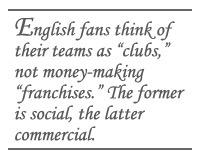
All of this goes some way in explaining the vitriol that greeted Scudamore's proposal. From a local perspective, the English game is at its heart a parochial beast. If Abu Dhabi isn't a market town in Shropshire, then EPL teams have no business playing league matches there. But while opponents of the “39th game” celebrate its rejection, the erosion of the game’s local backbone is already under way.
Take, for example, my “local” soccer club Arsenal, the pride of north London. Formed by laborers and trade unionists of the Royal Armoury in the 1886, Arsenal has historically drawn support from the working-class neighborhoods of north and northeast London. At the same time, the team has long had something of a global standing. It was the favorite of the African National Congress leadership-in-exile in London. Fidel Castro supports Arsenal, as does, notoriously, Osama bin Laden, who in a less antagonistic past life watched his beloved “Gunners” in the team's old ground at Highbury.
The 21st century Arsenal is an even more evolved species of global creature. A visit to the club's new spaceship-like stadium – the “Emirates,” sponsored by the UAE airline – is instructive. Advertising hoardings along the pitch flash messages in Thai and Vietnamese for the TV audience, or sell cheap flights to Reykjavik. The stadium boasts nearly twice the capacity of Highbury, Arsenal's former abode, barely a kilometer away. Yet ticket prices have still risen. In the early 1990s, entrance into Highbury didn't normally cost more than £10. The average ticket at the new ground is £44, or $86. A seat at “club level” – reserved mostly for corporate sponsors – can set one back £87.
The ground lacks the traditional edginess of English football stadiums, where terraced banks of supporters chanted through the match. Diehards miss the intimate and raw atmosphere of Highbury, with its all-standing “North Bank” and “Clock End,” and stunning circa 1910 art-deco façade. A new stadium has cemented in place a new attending audience, largely middle class and suburban.
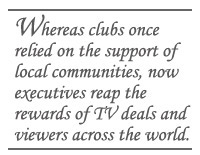
To find the old supporters, visit any number of boozers in the vicinity of the stadium on matchday. In colorful, peeling pubs like “the Bank of Friendship” or the “Yucatan,” locals gather to watch Arsenal on screen. Over the tinkling of pint glasses, snatches of Turkish, Yoruba and Yiddish mingle with that bruised dialect known in these parts as English. Arsenal sits in the shadow of Abu Hamza's Finsbury Park Mosque, in the midst of heavily immigrant areas, where successive waves of Irish, South Asian, Kurdish and West African immigrants, among others, have created a diverse local constituency for the team. Yet few of the denizens of the Yucatan have been to the Emirates stadium – they simply can't afford it. They bring their children to the pub, decked in miniature Arsenal shirts and hats. These young boys and girls grow up in spitting distance of Arsenal, but most won’t see their heroes in the flesh.
The EPL hasn't left its base so much as its base has fundamentally changed. Whereas clubs once relied on the support of local communities, now executives reap the rewards of a cleaned-up marketable game, winning TV deals, canny commercial sponsorships and viewers across the world. It’s a measure of the strange inequality of 21st-century English football that the game has become more accessible to a global public. In the rainy streets of its 19th-century roots, the EPL is all the more rarefied and removed. Supporters may have retained the matches on English soil for now, but the game is no longer their own.
Kanishk Tharoor is an editor and writer at openDemocracy.net.